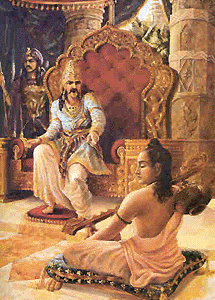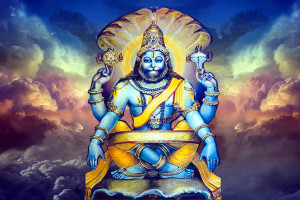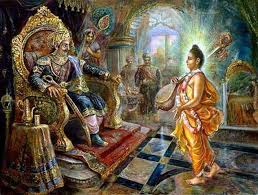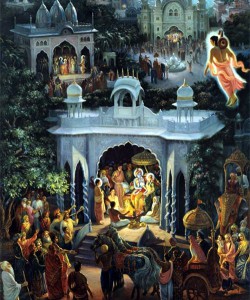Scandalous Remarks with Noble Intentions
Narada Muni, often perceived as a divine troublemaker, sometimes made remarks that outwardly seemed like scandalous gossip. However, his intentions were far from malicious. Narada aimed to ensure that evildoers received their due punishment while the virtuous were rightfully rewarded.
The Story of Kamsa
Kamsa was a cruel king known for his oppressive reign alongside his fellow Rakshasas (demons). His sister Devaki married Vasudeva, and during their wedding, an ominous prophecy was heard: “O Kamsa, you shall meet your end at the hands of the eighth child of Devaki.” Enraged by this prophecy, Kamsa drew his sword to kill Devaki immediately. However, Vasudeva pleaded with Kamsa, promising to hand over each child born to them. Convinced, Kamsa spared Devaki’s life.
Narada’s Intervention
Narada later met Kamsa in secrecy, sowing seeds of doubt and fear in the king’s mind. He warned Kamsa, saying, “O Kamsa, the angels have conspired to kill you. Your father Ugrasena, Devaki, and Vasudeva have all joined hands with the angels. You are a Rakshasa, and the angels are your sworn enemies.”
This revelation outraged Kamsa, prompting him to imprison Devaki and Ugrasena, and declare himself the king. Narada’s seemingly malicious gossip was actually a strategic move designed to accelerate Kamsa’s downfall.
The Noble Purpose Behind Narada’s Actions
Narada’s actions may appear deceitful, but they had a higher purpose. He understood that only when the wickedness of evildoers like Kamsa reached its peak would divine justice be served. By instigating Kamsa’s paranoia and cruelty, Narada hastened the fulfillment of the prophecy.
Kamsa’s atrocities increased rapidly. He sent numerous Rakshasas to kill the young Krishna in Nandagokula, but they all met their end. These escalating acts of cruelty justified Kamsa’s eventual punishment.
Krishna’s Just Retribution
Ultimately, Lord Krishna found ample justification to kill Kamsa. Through Narada’s intervention, the wicked king’s actions escalated, leading to his inevitable downfall at the hands of Krishna. This divine retribution restored righteousness and brought peace to the kingdom.
Lessons to Be Learned
- Divine Intervention: Narada’s actions demonstrate how divine intervention can sometimes take unexpected forms to fulfill a higher purpose.
- Acceleration of Karma: By pushing Kamsa to the peak of his evil deeds, Narada ensured that Kamsa’s karma was accelerated, bringing about swift justice.
- Role of a True Devotee: Narada’s loyalty to divine principles and his strategic actions underscore the role of a true devotee who works for the greater good, even if misunderstood.
- Fulfillment of Prophecy: The prophecy about Kamsa’s end was fulfilled through a series of events orchestrated by divine will, illustrating the inevitability of divine justice.
Narada Muni’s seemingly scandalous gossip ultimately served to uphold dharma (righteousness) and bring about the end of a tyrant, reinforcing the triumph of good over evil.



